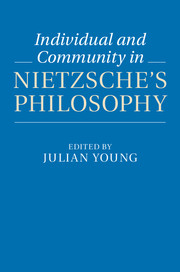Book contents
- Individual and Community in Nietzsche’s Philosophy
- Individual and Community in Nietzsche’s Philosophy
- Copyright page
- Contents
- Contributors
- Acknowledgment
- Abbreviations
- Introduction
- 1 Nietzsche
- 2 “The Time Is Coming When One Will Have to Relearn about Politics”
- 3 The Culture of Myth and the Myth of Culture
- 4 Festivals of Recognition
- 5 Nietzsche’s Scientific Community
- 6 The Good of Community
- 7 The Self versus Society
- 8 Nietzsche and the “Collective Individual”
- 9 “We Hyperboreans”
- 10 Nietzsche, Language, Community
- Index
3 - The Culture of Myth and the Myth of Culture
Published online by Cambridge University Press: 05 September 2014
- Individual and Community in Nietzsche’s Philosophy
- Individual and Community in Nietzsche’s Philosophy
- Copyright page
- Contents
- Contributors
- Acknowledgment
- Abbreviations
- Introduction
- 1 Nietzsche
- 2 “The Time Is Coming When One Will Have to Relearn about Politics”
- 3 The Culture of Myth and the Myth of Culture
- 4 Festivals of Recognition
- 5 Nietzsche’s Scientific Community
- 6 The Good of Community
- 7 The Self versus Society
- 8 Nietzsche and the “Collective Individual”
- 9 “We Hyperboreans”
- 10 Nietzsche, Language, Community
- Index
Summary
- Type
- Chapter
- Information
- Individual and Community in Nietzsche's Philosophy , pp. 51 - 76Publisher: Cambridge University PressPrint publication year: 2014
- 3
- Cited by

